Jack was smiling as he drove down Highway 70 toward the North Carolina coast. He anticipated a fun-filled weekend of diving shipwrecks in the Graveyard of the Atlantic. Having recently completed a tough and stressful instructor training course, he’d been thinking a lot about the responsibility of teaching others to dive and the associated legal risks. He was looking forward to a liability-free weekend of recreational diving on his own. No students, no customers, no risk — right?
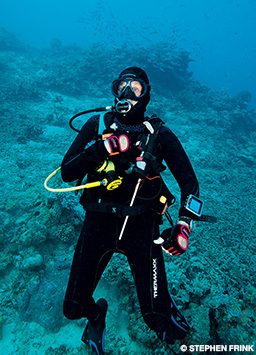
Regrettably, Jack is wrong. There is no escaping the fact that we live in a litigious society. Every profession carries with it the peril of a lawsuit following the injury or death of a client, student or participant, and diving is no exception. While Jack would not be instructing anyone during his trip offshore, just being in the vicinity of an incident that results in injury can unfortunately be enough to ensnare a professional in a web of litigation.
Consider if while Jack is in the water doing a recreational dive, for example, he observes another diver acting erratically — or at least in a manner not consistent with Jack’s training agency’s guidelines — but does not intervene. Then a little while later he notices that the same diver is not moving and appears to be unconscious. Jack is not going to ignore the diver’s peril; he’ll try to help get the diver to the surface. If the diver survives, it will be because Jack saved him. Suppose that the diver survives but suffers a serious, disabling injury. Now Jack might spend years defending a claim and lawsuit alleging that he is at least partly responsible for the diver’s injury, even if he is ultimately exonerated of any wrongdoing.
Numerous other scenarios could cause trouble for Jack during his weekend pleasure trip to the coast. Consider another example: Jack is on the boat preparing for his own dive when another diver on the charter panics and surfaces too quickly. A buddy brings the diver, who is unconscious and not breathing, back to the boat. Jack, relying on his first aid and CPR training, resuscitates the diver. After regaining consciousness, the diver has a heart attack, which he later claims was caused by improper first aid rendered by Jack. Again, Jack could be absolved of any negligence but still incur huge legal expenses to defend himself.
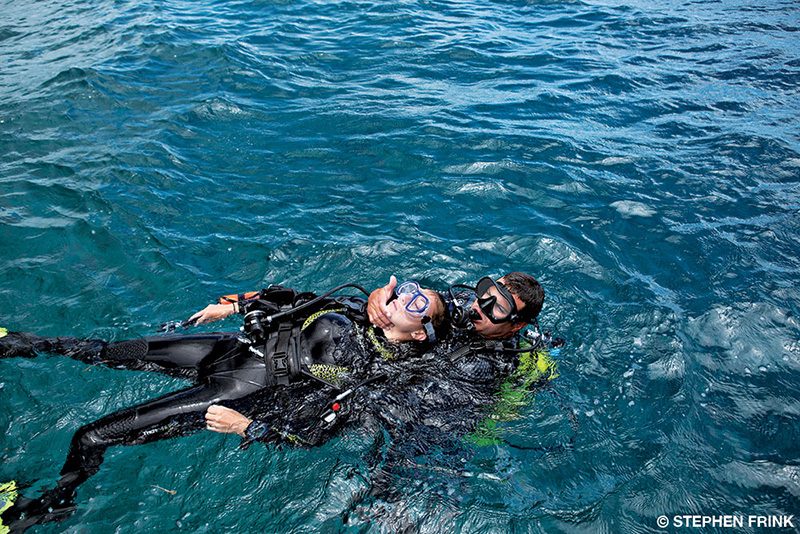
What if while Jack is gearing up for a dive he hears a call for help and sees the boat’s divemaster hanging on to the current line with a student who appears to be in distress? Jack dives into the water and swims out to assist, and the divemaster asks him to tow the distressed student back to the boat. While he’s towing the student by her tank valve, she becomes unresponsive and limp. Jack removes her buoyancy compensator and continues to tow her while holding her head above the water. On the boat Jack assists with CPR and the use of an automated external defibrillator (AED), but the student does not survive. If an autopsy finds water in her lungs, the student’s family might file a lawsuit claiming that Jack did not ensure she had an adequate airway during the tow and unintentionally drowned her.
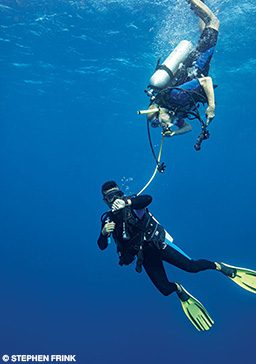
The reality is that anyone can sue you at any time. A student, an unsatisfied customer or another diver you meet on a dive trip can allege anything, including an untruth, that might cost you a great deal of time and many thousands of dollars in legal bills.
Jack, like most dive professionals, became an instructor because he truly enjoys diving and wants to share his passion with the world. There is risk in every profession, including diving, and professionals should not have to sacrifice their love of the sport to avoid it.
This article is not meant to be a legal primer on negligence, liability, duties owed to others, the definition of a “reasonable person” or any of the myriad other issues that can arise out of a claim against someone for injuries incurred by someone else. For the purposes of this article, it is enough to know that there are unwelcome and undeserved claims as well as real and true acts of negligence that result in claims.
So what can Jack — or you — do to protect against a false or real claim of negligence that involves an injury to another person? And what would be the benefits of these actions to you, the dive professional, as well as to the dive business, the industry and the average recreational diver? These questions raise two important areas of consideration: risk mitigation and professional liability insurance.
Risk Mitigation
Risk mitigation is an essential element of any plan to promote diver safety and to protect dive professionals, students and all divers. For nearly 40 years no entity has been more active in identifying and dealing with the risks inherent to the sport of scuba diving than Divers Alert Network®.
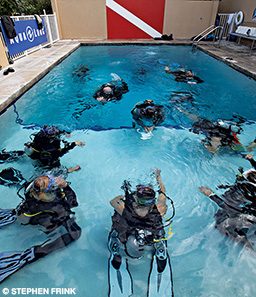
As part of its efforts to create a global culture of safety in the dive community, DAN® has developed a dive-industry-specific Hazard Identification and Risk Assessment (HIRA) program that focuses on practical assessment of risks and provision of information and resources to reduce the number and severity of dive accidents. The program targets dive professionals in an effort to make diving safer for those they certify and, ultimately, everyone involved in diving. DAN research shows that when dive businesses and professionals have the tools and plans in place to deal with emergencies, they can reduce the number of emergencies and enable all divers to better enjoy the wonders of the underwater world.
To that end, all dive professionals should routinely be aware of and make sure they are
- properly trained for the type of instruction they are giving and the diving they are doing in the pool or other body of water;
- continuing their dive education and adhering to the standards of their training agency;
- taking risks seriously, identifying them, learning what can go wrong and how to deal with emergencies that are sure to come at some point in one’s career;
- preparing and practicing action plans for emergencies and required skills such as CPR, wound care, injured diver retrieval and more;
- using checklists;
- maintaining all the equipment necessary to safely perform their professional duties;
- using waivers and medical reporting forms that are up-to-date and properly completed and signed;
- ensuring that the divers who come in contact with their businesses and/or who they instruct are receiving the appropriate and necessary instruction before certification;
- exercising proper judgment about their students’ and customers’ abilities and medical conditions and understanding that while professionals must adhere to the laws and regulations of the dive industry they can elect not to provide service when safety concerns exist; and
- reporting incidents to their training agency as soon as possible — both to protect themselves and to provide data that could be useful to others.
There is much more to risk mitigation than can be addressed in this article. Dive professionals and everyone involved in diving should recognize the value of learning more about risk assessment as a means of promoting safety for all divers. Those who wish to learn more about the subject should read DAN’s Risk Assessment Guide for Dive Operators and Dive Professionals by Francois Burman. This book offers a detailed list of recommendations “intended to ensure a minimum accepted level of safety for scuba diving activities.”
Even if you — and Jack — are always careful, follow all safety and training protocols, would never intentionally hurt anyone and judiciously comply with risk mitigation recommendations, the fact is that accidents, mistakes and events beyond your control still happen. No matter how safe you try to be for yourself and others, you are always at risk financially if you or someone else is injured while under your supervision, in your shop, being trained by you or even being rescued by you. For this reason you must have the appropriate insurance plan for the financial protection of your assets, your business and your career.
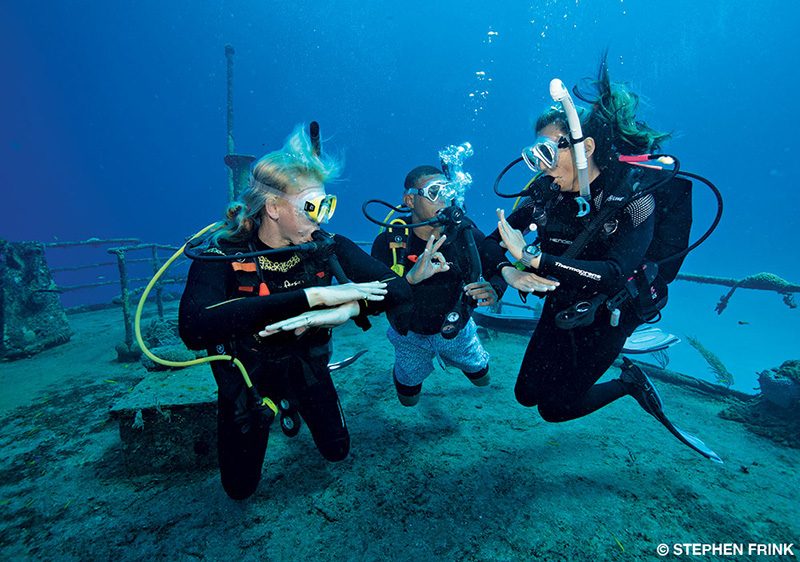
Professional Liability Insurance
There are several types of insurance coverage that all divers should consider when engaging in dive activities: accident, travel, equipment and general health/medical. Even automobile insurance is important for the drive to the shore or dive boat. Most coverage benefits only the person who procured the policy. Liability insurance for dive professionals (like automobile liability insurance for drivers), however, provides benefits to the professional who purchased the policy as well as the injured student or diver with a legitimate claim against the professional.
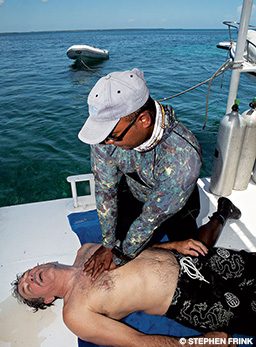
What about Jack? As an individual instructor he is at the forefront of the dive industry when training and directly engaging with new divers. If he works for a dive shop, why should he be concerned about his actions and liability on a personal dive trip? If Jack is a full-time employee of a dive shop or if he is listed as an additional insured on the shop’s liability policy, then he will generally be protected only when he is engaged in activity on behalf of the shop.
If Jack is characterized as an independent contractor and not an employee, however, or if he isn’t listed on the shop’s policy, he may not be covered at all.
Even if Jack is an employee of a dive shop and is listed on the shop’s policy, he will most certainly face liability claims on his own if an incident occurs while he is providing training outside of his work duties through his employer — such as helping a local scout troop, advising individual clients or simply helping save someone while on a personal dive trip. Jack needs his own professional liability policy.
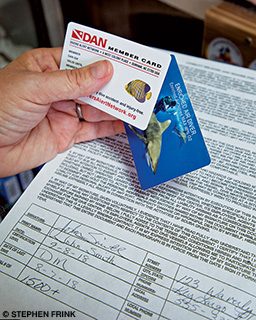
All dive professionals, whether individuals, groups or businesses, should consult with a liability insurance expert to acquire coverage by a plan that fulfills their specific needs. Dive businesses, large or small, incur risks beyond those related to hands-on training of divers, including risks related to equipment provided to students, cylinder fills, air and gas quality, repairs, transportation, employee issues, boats and crews, and dozens of other identifiable risk areas. (Many of these risks are subjects of DAN’s HIRA program and can be explored in DAN publications and risk-assessment programs.)
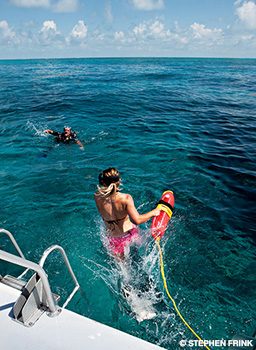
Seemingly minor mishaps can saddle a business with a financial burden that threatens its continued existence. For example, a student slips on a boat ladder, strikes her head on the hull and complains of a headache. She decides not to make a training dive that day and doesn’t show up for any further training dives. Later the dive shop that provided the boat and maintained the ladder is informed that the student suffered brain trauma that required surgery and resulted in permanent disability. No matter how the litigation is resolved, the defense of the claim will incur tremendous expense. Professional liability insurance can provide for those defense costs. Just as important to the dive business and to the injured student, it can provide for the payment of medical expenses and damages if the business is found to be at fault. Thus, the student benefits, and the business can survive and continue to serve the dive community.
The right liability insurance plan for Jack may not be right for you or your dive shop. Many areas of protection need to be explored, not the least of which is the cost of the plan. An insurance specialist can provide the details of the coverage and customize the plan to include protection — such as technical and rebreather training, freediving, student accident coverage and much more — that is not readily available from other insurance providers. You need to ask questions about the terms, and you should expect informed and understandable responses. The right plan will offer many benefits, and your provider should be familiar with all of them, particularly as they apply to your specific profession: scuba diving.
With excellent risk mitigation practices you can greatly limit your liability. While the best-case scenario is that you’ll never need your liability insurance, one thing is certain: You can feel more secure knowing that you have a professional liability policy to protect your finances and your dive career.
© Alert Diver — Q2 2019